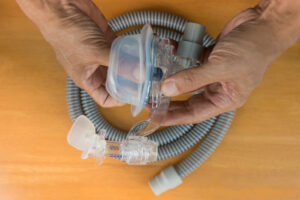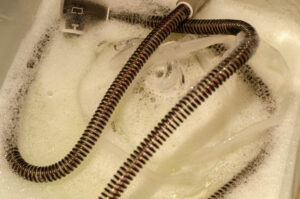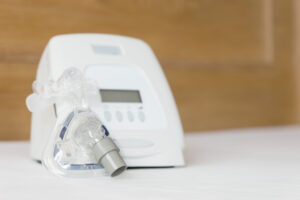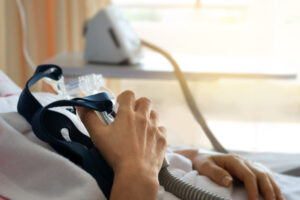If you have sleep apnea and were prescribed a CPAP machine, you may have noticed some of the CPAP side effects that come along with wearing it. Recognizing what these problems are can help you to find solutions so you can wear your CPAP comfortably and get a good night’s sleep.
Common CPAP Side Effects
Although CPAP therapy is one of the most successful methods for treating and reducing the symptoms of sleep apnea, there are a host of CPAP side effects that may follow after constant use of sleep apnea equipment. If you wear a CPAP mask and use a CPAP machine, these issues might sound familiar to you.
Aerophagia
This is the medical term for eating or swallowing air. This generally occurs when the CPAP pressure is too high for you and can result in gas and bloating.
Discomfort
Wearing a CPAP mask can sometimes cause discomfort when trying to sleep. The mask can feel bulky and constrictive, and the hose can get in the way of trying to sleep in positions other than your back. Exhaling can also be uncomfortable if the pressure of the sleep apnea equipment is too high.
Claustrophobia
Many people feel claustrophobic while wearing a CPAP mask because the mask fits snug around your nose. The feeling of claustrophobia can be even worse for those who wear a full-face mask that sets around your mouth and nose.
Mask Leak
If your CPAP mask does not fit properly or isn’t properly cleaned, it can cause leakage. When there is a leak, there is a high probability that your CPAP machine isn’t able to reach its set pressure.
Dry, Stuffy Nose or Nosebleeds
Having a dry or stuffy nose is a common side effect of CPAP because air from the machine is being blown into your airway. This constant flow of air can also cause nosebleeds to occur.
Skin Irritations
Because CPAP masks fit snug against your face and are worn repeatedly, your skin can become irritated. This CPAP side effect can result in skin irritations such as rash or pressure sores.
Dry Mouth
Suffering from a dry mouth is yet another common CPAP side effect for those with a full-face mask, as well as patients with a nasal mask who breathe out of their mouths.
Infections
If a CPAP machine or CPAP mask isn’t properly cleaned on a routine basis, infections, such as lung or sinus infections, can occur.
Headaches
Although headaches are not a common CPAP side effect, they can occur if the machine’s pressure is set too high or if you have a blockage in your sinuses.
Lung Discomfort
Some patients who use CPAP therapy complain of a burning sensation in the lungs. This is often a result of dry or cold air being inhaled from the CPAP mask. This CPAP side effect can possibly be reduced by using warm humidification.
Dizziness
Some complain of dizziness after wearing a CPAP mask. While the mechanism for this symptom is not clearly known, some believe that this might be due to the pressure change in the middle ear. The symptom should be short lived if due to CPAP therapy.
Shortness of Breath
While another common CPAP side effect is the complaint of shortness of breath, this feeling is usually sensorial. It is merely the sensation of not getting enough air because a functional CPAP machine never reduces the amount of air that can be inhaled.
Even though there are side effects related to using sleep apnea equipment, it’s important to be compliant with continuing to wear it. Not using your CPAP mask and machine as prescribed can cause larger, more severe health problems such as fatigue, high blood pressure, heart arrhythmias, heart failure, heart attack, or stroke.
How to Prevent CPAP Side Effects
If you’re experiencing any of the CPAP side effects mentioned above, don’t give up on the treatment just yet. There are solutions to these common problems. Try these different strategies to reduce or completely halt your CPAP side effects.
Clean Your CPAP Regularly
Make sure that your CPAP mask and machine are clean. It is important to make cleaning your mask, tubing, and water chamber a regular habit to avoid any bacteria or fungi buildup. The CPAP mask and humidifier chamber should be cleaned daily with mild soap and water. On top of this, you should soak all of the parts in vinegar and water, using one part vinegar to three parts water. Follow this routine once a week. There are also sanitizing machines, like a CPAP cleaner, that you can purchase if you are having trouble keeping up with this cleaning schedule.
Avoid Using Oily Products
Oily products like makeup or moisturizer can be a major cause of CPAP side effects. Remove any of these products from your face before applying your mask. Otherwise, the oil can build up on the mask if not cleaned daily.
Make Sure You Have The Proper Mask
CPAP masks are available as nasal masks, full-face masks, and nasal pillows because one type of mask isn’t suitable for everyone. Before choosing a mask, there are a few factors you should consider. Mouth breathing, claustrophobia, sleep position, and machine pressure are important areas to evaluate. These should be discussed with your doctor before choosing which type of mask you should be wearing.
Check Your Humidifier
If you’re having CPAP side effects relating to respiratory irritation, dry mouth, dry nose, or nosebleeds, check your humidifier to make sure it’s working properly. Also, as previously mentioned, make sure you’re cleaning it regularly.
Try Switching to Heated Tubing
Heated tubing warms the air traveling through the CPAP and can improve its temperature. The tube, filter, and mask are part of the CPAP supplies.
Consider Sinus Medication
If your sinuses are blocked, talk to your sleep doctor to see if you need a sinus medication to let your CPAP work more effectively and reduce your CPAP side effects.
Try Using Mask Barriers
Creating a barrier between the CPAP mask and your skin can help with skin irritations such as sores and rashes. There are barriers you can purchase that are sometimes made with gel or cloth. A hypoallergenic tape can also work to create a barrier.
Make Sure Your Strap is Secured
If your mask is strapped on too tight it can cause skin irritations. If it is too loose, it can cause a leak. Take the time to ensure your CPAP mask strap is secured properly to avoid any unnecessary CPAP side effects.
Adjusting CPAP Pressure to Avoid CPAP Side Effects
If the other methods don’t work to relieve your CPAP side effects, it may be time to adjust your CPAP machine’s pressure. Here are a few notes to remember when it comes to perfecting your CPAP pressure.
Make Sure You’re Using the Correct Pressure
Make sure the pressure on your CPAP machine is the pressure that was prescribed to you. If it is and you’re still having trouble with discomfort while exhaling, swallowing air, or feel the pressure may be too high, you may want to talk to your doctor to see if your pressure setting needs to change.
You May Need a New Pressure
If you’ve gone through recent lifestyle changes such as quitting smoking or drinking, weight gain or loss, or changes to your underlying medical condition (such as diabetes), some of the original symptoms of obstructive sleep apnea (OSA) may reappear, due to residual sleep disorderd breathing. These changes to your lifestyle or medical condition may require a new pressure setting for your CPAP or BiPAP. With advances in technology, an FDA cleared OSA test that can be done in your home, with the results interpreted by a certified physician, remotely.
Try Using the Ramp on Your Machine
When you use the ramp on your sleep apnea equipment, your CPAP machine starts out at a lower pressure and gradually increases until it reaches your set pressure. Using this gradual technique can increase your comfort level, as well as help you get used to wearing your mask each time you put it on.
Always make sure to talk to your doctor before making any changes to your CPAP routine. Since the side effects of sleep apnea outweigh the CPAP side effects of using a CPAP mask and machine, it’s important to find a solution so you can wear your CPAP comfortably and consistently.
Get Your Sleep Questions Answered Live on 4/30
Have questions about sleep? Get all your sleep-related questions answered in a Live Q&A on YouTube with renowned sleep expert Dr. Michael Breus at 5 p.m. PST/8 p.m. EST.









